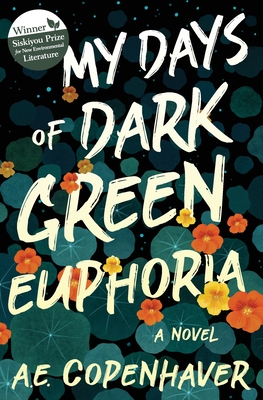A.E. Copenhaver
Ashland Creek Press ($19.95)
by Garin Cycholl
The lost subtext of climate change is not in the mounds of data or winnowed diversity of lost species and habitats, the redrawn frost lines or earlier arrivals of “spring”—it’s in how denial has disfigured humanity. Is there even language for the uncanny shapes taken by time and space in this moment? Deep into A.E. Copenhaver’s novel My Days of Dark Green Euphoria, her protagonist Cara pokes the news buttons of her vehicle’s radio, thinking, “What fun to ponder the vocabulary of climate change with a reporter . . . whether climate breakdown, crisis, or emergency was more appropriate . . . while roaring down the freeway at seventy-seven miles per hour, getting fourteen miles per gallon.”
Winner of the Siskiyou Prize for New Environmental Literature, My Days of Dark Green Euphoria travels at that velocity. Cara, who seeks to maintain a negative carbon footprint, works at a nonprofit that advocates for more ecologically responsible choices and daily sorts through the Whole Foods dumpster for her breakfast on her way to work. She refuses to establish a permanent address; rather, she only housesits, shrinking into the lives of others. Stung with perpetual self- (and species-) awareness, she journeys within a “small, sad self.” From the moment that she was appointed as the “primary outhouse coordinator” in a school internship, this cursed insight has led her into an “eerie kind of evolutionary exile.” Her tolerance for other human beings has almost disappeared, although she realizes that solitude is not sustaining. Locating herself somewhere between the prophet Jonah’s Nineveh and Thoreau’s Walden, she has reached the recognition that there is “nothing noble anymore in living isolated from society.”
Through a housesitting gig, Cara meets Dan. Their relationship “works” through mutually satisfying sex and heightened “alone time” due to Dan’s intense travel schedule for his job, but Cara tries to imagine stitching her life further into his. One night, she puts him through an unknowing test as she watches him deal with a spider in the bathroom. Will he simply kill it? She furtively observes him in this eco-moral dilemma, then celebrates that he has to leave on business immediately thereafter, joyful “lest I allow my disappointment in him to fester into passive-aggressive reality.” The next weekend at brunch she meets Dan’s mother, Millie, who takes an entranced Cara out for a pedicure, street tacos, and a memorable trip down the liquor aisle in Target. Fascinated by the depth of Millie’s unthinking consumption, Cara crashes somewhere between the cosmetics counter and the drive home, having been derailed by their pilgrimage for fun.
The anxieties of finding an impossible balance that most of us feel ring deeply and physically from the outset of this novel. A wounded creature on a wounded planet, Cara seeks “some kind of sublimation . . . so [her] entire being disappears into ecological harmlessness.” Numbed and enraged, she follows cycles of self-denial and hopelessness; neuro-prophet and YouTube viewer, she recognizes that the necessary remedy is somewhere “deeper than molecular repair.” In COVID-tide, where so many of us feel spun between guilty binges of junk TV while also being laid open to the ugly realities at hand, Copenhaver’s insights strike a chord. Cara laments, “This was not the land of freedom; this was the land of dependency and disconnect,” and she realizes that everything is “bought and paid for . . . with the very fabric of our existence.” Against and within this insight, Cara works to come to terms with being alive in an increasingly broken world. With language that both makes the reader laugh out loud and awakens a cutting empathy, the novel follows her embodied journey splendidly.
Given its humor, sharp voice, and playful tone, readers might be tempted to label My Days of Dark Green Euphoria as Sex in the City turned inside out, with fewer characters and fuller ecological angst. Copenhaver, though, reaches much deeper into our consciousness of the shifts around and within us. This is a tough novel, replete with Cara’s consumption of graphic videos of the food-industrial complex and intense moments of personal disintegration. At the opening of the novel, she notes, “It’s almost a talent, to read the subtext of the world.” Copenhaver has brought that story into the light of our eerie present, recognizing the force of denial and how deeply planetary crisis has been a part of ourselves and our days.
Click here to purchase this book at your local independent bookstore
Rain Taxi Online Edition Summer 2022 | © Rain Taxi, Inc. 2022


